|
|
|
Sort Order |
|
|
|
Items / Page
|
|
|
|
|
|
|
| Srl | Item |
| 1 |
ID:
136459


|
|
|
|
|
| Summary/Abstract |
When Britain entered the First World War it did so as an especially hesitant belligerent. One month later, the British enthusiastically signed the Treaty of London, stating that the Entente powers would prosecute the war in common and that none would pursue a separate peace. Why would a state long known for jealously guarding its ability to maintain a free hand initiate a binding alliance that restricted its war termination prospects after one month of combat? And what were the effects of its decision to do so? Answering this question requires not only that we examine British decision making but that we understand No Separate Peace Agreements and why states sign them. I hypothesize that a state will initiate a No Separate Peace Agreement when it has reason to fear that one of its cobelligerents may defect. I also hypothesize that No Separate Peace Agreements will cause states to reconcile war aims with their allies, agreeing to different terms of peace than might have been necessary to satisfy any one of them individually. Using new archival documents, I analyze a case study of British decision making in the early weeks of World War I and find substantial support for the hypotheses.
|
|
|
|
|
|
|
|
|
|
|
|
|
|
|
|
| 2 |
ID:
134647


|
|
|
|
|
| Summary/Abstract |
This paper starts from the assumption that geostrategic and security interests alone are not sufficient to explain China’s foreign policy choices. It argues that ideas about what China’s role as an actor in the increasingly globalised international system should be, and about world order in general, have a deep influence on China’s foreign policy decision-making process. Taking the North Korean issue as a case study, the paper postulates that China is currently engaged in a search for a ‘new’ identity as a global player. China’s actor identity is composed of various partly contradictory role conceptions. National roles derived from China’s internal system structures and its historical past lead to continuity in foreign policy, while the ‘new’ roles resultant from China’s rise to global power require an adaptation of its foreign policy principles. In the case of its relationship with North Korea, China’s foreign policy is oscillating between the two roles of ‘socialist power’ – as thus comrade-in-arms with its socialist neighbour – and ‘responsible great power’, which leads to it being expected to comply with international norms, and thus to condemn North Korea’s nuclear provocations and related actions.
|
|
|
|
|
|
|
|
|
|
|
|
|
|
|
|
| 3 |
ID:
136825


|
|
|
|
|
| Summary/Abstract |
Energy has emerged as the most important factor to shape geopolitics of Eurasia not only due to its value as a COMMODITY in supply but due to its role as an instrument to advance the strategic goals of global and regional powers in the Eurasian space. Central Asia due to its vast energy wealth is nowadays considered to be the key to the security of Eurasia. During the Cold War, Central Asian region was largely perceived as a peripheral space within the Soviet Union. The sameEurasian space has now become the object of the so-called ‘New Great Game’. This article will critically analyse Mackinder’s Heartland theory and will study what does the metaphor-New Great Game refer to. However, more than that, it is important to ask to what extent ‘New Great Game’ is correctly used to describe the geopolitical context and atmosphere of competition for access to the black gold in Central Asia. It is probably a myth that has been overtly or covertly nourished by novelists and commentators of geopolitics.
|
|
|
|
|
|
|
|
|
|
|
|
|
|
|
|
| 4 |
ID:
134486


|
|
|
|
|
| Summary/Abstract |
A more powerful China under the seemingly confident leadership of President Xi Jinping has committed to a more activist global policy. In particular, this commitment has influenced Beijing's policy towards UN peacekeeping operations, with a long-awaited decision to add combat forces to the engineering troops and police and medical units that have been features of its past contribution. In addition, Beijing has doubled the size of its contribution to the UN peace operations budget. This article explains why the UN is a key venue for China to demonstrate its ‘responsible Great Power’ status and expressed willingness to provide global public goods. The main explanatory factors relate to the UN's institutional design, which accords special status to China even as it represents a global order that promotes the sovereign equality of states. Moreover, there are complementarities between dominant Chinese beliefs and interests, and those contained within the UN system. Especially important in this latter regard are the links that China has tried to establish between peacebuilding and development assistance with the aim of strengthening the capacity of states. China projects development support as a contribution both to humanitarian need and to the harmonization of conflict-ridden societies. The Chinese leadership has also spoken of its willingness to contribute to peacemaking through stepping up its efforts at mediation. However, such a move will require much deeper commitment than China has demonstrated in the past and runs the risk of taking China into controversial areas of policy it has hitherto worked to avoid.
|
|
|
|
|
|
|
|
|
|
|
|
|
|
|
|
| 5 |
ID:
136830


|
|
|
|
|
| Summary/Abstract |
Central Asia has emerged as an important source of energy and strategic arena for the major powers of U.S., Russia and China where energy diplomacy has forged a major thrust in their foreign policy. Energy diplomacy in Central Asia is defined by the competition among various stakeholders and the mediation by the state in making the deal. Moreover, the energy diplomacy shares two common assumptions i.e. actors and factors. So, in the game of energy diplomacy in Central Asia, there are so many global and regional players involved out of which India is one of them. But in this game, how India has sought to strengthen its position with the involvement of major powers for accessing huge amount of energy resources from the region is lucidly explicated. Nevertheless, the article promptly attempts to draw a picture on India’s approach in Central Asian energy diplomacy.
|
|
|
|
|
|
|
|
|
|
|
|
|
|
|
|
| 6 |
ID:
135934


|
|
|
|
|
| Summary/Abstract |
The EU calls itself a “soft power,” making “soft power” contributions to Asian security. That is undoubtedly what the EU is and does in Asia and the track record of European contributions to Asian peace and stability through economic and financial as well as development aid and technical assistance over the decades is not unimpressive. As will be shown below, over recent years Brussels and the Union's individual member states have sought to increase their involvement and role in Asian “hard security,” attempting to get rid of its reputation of being security a “free-rider” enjoying but not sharing the burden of US regional security guarantees. While the EU will continue to be a “hard security” actor in Asian security within limits, it is advised to concentrate its security cooperation with like-minded partners such as Japan and the US as opposed to hoping that talking to Beijing on regional or global security issues produces tangible results. As will be shown below, it clearly does not as Beijing continues to conduct very assertive and at times aggressive regional foreign and security policies insisting on the “principle of non-interference” in Chinese domestic and foreign policies. Consequently, EU influence on Chinese foreign and security policies in general and its increasingly aggressive policies related to territorial claims in the East China and South China Seas will continue to exist on paper and paper only.
|
|
|
|
|
|
|
|
|
|
|
|
|
|
|
|
| 7 |
ID:
136334


|
|
|
|
|
| Summary/Abstract |
When the German Grand Coalition formed by the two major parties of the Bundestag came to power in December 2013, the new government discontinued its constrained foreign policy profile and, by sending out signals of adjustment, expressed its“big power ambition.”The reality of German proactivity became obvious to the international community during the Ukraine crisis and the U.S. hacking incident. Although factors from German history will slow the full implementation of this policy in the near future, the country cannot but succeed in developing its position among big powers.
|
|
|
|
|
|
|
|
|
|
|
|
|
|
|
|
| 8 |
ID:
135127


|
|
|
|
|
| Summary/Abstract |
Eastern Antioquia, Colombia—In late 2001, Sandra Mira was kidnapped while riding a bus with her six-year-old daughter through rural Colombia. Paramilitaries in camouflage uniforms stopped the bus and forced both to disembark. They tied up Sandra, then returned her daughter to the bus. When the girl arrived in San Carlos, the town where the family lived, she asked someone to call her grandmother, Pastora Mira.
|
|
|
|
|
|
|
|
|
|
|
|
|
|
|
|
| 9 |
ID:
136105


|
|
|
|
|
| Summary/Abstract |
In January 2012, the US administration released new strategic guidance for the Department of Defense entitled ‘Sustaining US Global Leadership: Priorities for 21st Century Defense’. Two different security approaches seem to coincide in this document. By providing a governmental reading of the new strategic guidance, the aim of this article is to discuss if and how the guidance links a sovereign security understanding of great power politics on one side to governmental rationalities on the other. First, the guidance is discussed with regard to its main aims and strategies; then, second, the impact of governmentality in the guidance is revealed and systematized. Finally, the function that governmental logics have in the document, and the conceptual and political role that the minimally mediated encounter of sovereign (military) power politics with governmental rationalities plays, are considered.
|
|
|
|
|
|
|
|
|
|
|
|
|
|
|
|
| 10 |
ID:
136305
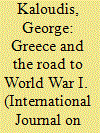

|
|
|
|
|
| Summary/Abstract |
The article, “Greece and the Road to World War I” by George Kaloudis, focuses on the nature of nation-state alliances and the configuration of great powers vs. smaller powers. It discusses the impact World War I had on a smaller state. Smaller states were lured into alliances with larger powers both for promises of protection and promises of a share of victory spoils. In the case of Greece, the war divided the nation internally as the king sided with the Central Powers while the democratically elected leader sided with the Allied Powers. The goals of modern democratic states are often determined by large institutional interests, rather than the head of state, as described by outgoing U.S. President Eisenhower’s famous warning about the “military-industrial complex.”
|
|
|
|
|
|
|
|
|
|
|
|
|
|
|
|
| 11 |
ID:
136455


|
|
|
|
|
| Summary/Abstract |
This article examines the international effects of a variable that has yet to be studied in a systematic manner in the international relations literature: the number of prominent, distinct ideological groups that are present in a particular system, which is a variable that I label “ideological polarity.” My basic argument is that systems in which the great powers are divided into one, two, or three or more ideological groups (or “ideological unipolarity,” “ideological bipolarity,” or “ideological multipolarity,” respectively) have very different dynamics, including major variations in overall threat perceptions among the great powers and the efficiency of the balancing process against perceived dangers. The effects of ideological polarity explain key outcomes that analyses based on power polarity cannot. I test the argument by examining great power relations in two cases: the decades after the Napoleonic Wars and the years leading up to the Second World War. Both periods were multipolar in terms of power but varied in terms of ideological polarity. The result was significant variations in states’ core security policies for reasons consistent with the argument.
|
|
|
|
|
|
|
|
|
|
|
|
|
|
|
|
| 12 |
ID:
135217
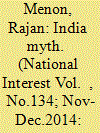

|
|
|
|
|
| Summary/Abstract |
OVER THE last two decades, numerous books, articles and press commentaries have hailed India as the next global power. This flush of enthusiasm results partly from the marked acceleration in India’s economic growth rate following reforms initiated in 1991. India’s gross domestic product (GDP) grew at 6 percent per year for most of the 1990s, 5.5 percent from 1998 to 2002, and soared to nearly 9 percent from 2003 to 2007, before settling at an average of 6.5 percent until 2012.
|
|
|
|
|
|
|
|
|
|
|
|
|
|
|
|
| 13 |
ID:
136150


|
|
|
|
|
| Summary/Abstract |
Public service mandarins were once largely anonymous, diligently wielding their great power behind the scenes while their political masters performed on the front stage. Things have changed. Today, civil service leaders are appearing publicly more often, in more places and to a wider range of audiences than ever before. This article examines the extent to which this decline in anonymity impacts on traditions of civil service impartiality within the Westminster system. It draws on the late Peter Aucoin's concept of ‘promiscuous partisanship’ to examine how contemporary mandarins in the United Kingdom, Canada and Australia face accusations of having compromised their impartiality by advocating for the policy agenda of the government of the day. The article argues that what has changed is not that civil service leaders have suddenly become partisan, but rather that they have become more ‘public’, allowing for perceptions of partisanship to emerge
|
|
|
|
|
|
|
|
|
|
|
|
|
|
|
|
| 14 |
ID:
135856


|
|
|
|
|
| Summary/Abstract |
The late 1970s’ decline of bipolar détente and economic problems in the developed world, on the one hand, and the Sino–Soviet conflict and the start of the Chinese reform programme, on the other, led to converging interests between the People’s Republic of China and Western Europe. Against this background, this analysis compares how the governments of Britain, France, and West Germany pursued their China policies between 1978 and 1982. Whilst supporting the PRC’s reform process in multiple ways, shared strategic objectives were not sufficient for the creation of a de facto alliance.
|
|
|
|
|
|
|
|
|
|
|
|
|
|
|
|
| 15 |
ID:
134526
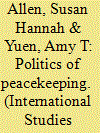

|
|
|
|
|
| Summary/Abstract |
Why are some peacekeeping mandates broad and expansive while others are narrow and well defined? Does variation in mandate flexibility reflect the needs inherent in resolving the conflict or the political interests of powerful states? The modern thread of debate surrounding UN action focuses on whether the political interests of the Permanent Five (P5) members in the Security Council or the stated goals of the institution as a whole drive UN behavior. While most analyses focus on where the UN intervenes to assess the political “pull” that member states exert on the institution, we examine variation in operational latitude across UN peacekeeping in war-torn states. Our analysis offers three main results. Powerful states do constrain international bureaucracies; however, bureaucratic independence varies with the intrinsic interests of the P5. Further, heterogeneity across powerful state preferences systematically affects bureaucratic flexibility in peacekeeping.
|
|
|
|
|
|
|
|
|
|
|
|
|
|
|
|
| 16 |
ID:
136553
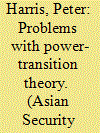

|
|
|
|
|
| Summary/Abstract |
What happens when established states and rising powers meet on the world stage? Is conflict inevitable, or can adroit foreign policies produce peaceful accommodation between jostling Great Powers? Traditional power-transition theory tends to predict conflictual outcomes of shifting power, but this finding does not square with either the historical record or public policy-maker’s own intuitions about how international politics works. In this article, I exegete a central weakness of extant power-transition theory—that is, its reliance on vanishing disparities in national power as an explanatory factor—in order to understand where the theory is failing and how best to proceed with a view to generating greater understanding of geopolitical shifts. Beginning from the starting point that social science theory should generate useful implications for ‘real world’ social and political actors, I argue that power-transition theory’s monocausal vanishing disparities thesis is problematic in three respects: practical, theoretical and empirica
|
|
|
|
|
|
|
|
|
|
|
|
|
|
|
|
| 17 |
ID:
134753


|
|
|
|
|
| Summary/Abstract |
For decades the United States has forged close relations with a number of key allies in the Arab world, particularly Egypt and Saudi Arabia. These close ties were based largely on perceived national interest, not mutual values. The fundamental changes in the Arab world since early 2011 (the so-called Arab Spring) have drastically altered the regional strategic landscape. This essay examines the US response to the political upheaval in the Arab world. It argues that the United States should distance itself from the changes in the Arab world and give the newly established regimes the space they need to sort out their futures. Meanwhile, Washington should further strengthen relations with the non-Arab Middle Eastern “peripheries,” specifically, Israel and Turkey. Also, the nuclear deal signed between Iran and major global powers in November 2013 provides a significant opportunity to open a new chapter in relations between Tehran and Washington.
|
|
|
|
|
|
|
|
|
|
|
|
|
|
|
|
| 18 |
ID:
134766


|
|
|
|
|
| Summary/Abstract |
China’s contemporary leadership does not have a “grand strategy” for the 21st century and it is unlikely that the new leaders, who came into power in 2012–13, will be able to craft one. This is a viewpoint that goes against the established truth about China’s comeback as a great power in the international arena. China observers concur and to some extent admire the Chinese leadership’s ability to think long term and commitment to patiently work towards the realisation of a grand vision for the “Middle Kingdom”. There is, undoubtedly, a great deal of strategic thinking going on in China, but it has not been translated into any coherent strategy. Today’s Chinese leaders are pragmatists, seeing and seizing every opportunity that arises without a binding plan. They are also introverted, however, and forced to engage in short-term fire-fighting rather than think long term.
|
|
|
|
|
|
|
|
|
|
|
|
|
|
|
|
| 19 |
ID:
136627


|
|
|
|
|
| Summary/Abstract |
Foreign policy experts have struggled to describe the unusual character of contemporary world politics. Much of the debate revolves around the concept of polarity, which deals with how power is distributed among nations, as experts ask if the United States is still a unipolar power or in decline as new powers emerge.1 The polarity debate, however, obscures more than it clarifies because the distribution of power does not determine the fate of nations by itself. It leaves out strategic choice and does not predict how the United States would exercise its power or how others would respond to U.S. primacy. World politics can take many paths, not just one, under any particular distribution of power. The most remarkable feature of post-Cold War world politics has not been the much-discussed power accumulation of the United States—although that is indeed noteworthy—but rather the absence of counter-balancing and revisionist behavior by other major powers.
|
|
|
|
|
|
|
|
|
|
|
|
|
|
|
|
| 20 |
ID:
134676
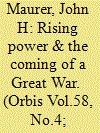

|
|
|
|
|
| Summary/Abstract |
This article examines the strategic decisions that led to the struggle between Britain and Germany, exploring how a great war involving Europe's leading powers could come to pass. In 1914, there were no forces beyond the control of decision makers pushing them into the grisly war of attrition that destroyed the social and political fabric of nineteenth-century Europe and ushered in the horrors of the twentieth century. Rather, those horrors resulted from poor policy and strategic choices made by the leaders of the great powers. The war's outbreak underscores history's contingent nature, dramatically showing how errors in judgment on the part of political and military leaders can ruin great countries. One stark lesson of the Great War is that no leader sought as an outcome the conflagration produced by their decisions. Today, China's weapons programs and foreign policy assertiveness conjures up fears that Beijing seeks to establish a new international order, much as Germany's rulers tried to do a hundred years ago with such catastrophic consequences. Shaping the internal debate among China's rulers, so that they judge self-restraint in armaments and strategy as being in their best interest, will test the strategic acumen of American leaders in the years ahead.
|
|
|
|
|
|
|
|
|
|
|
|
|
|
|
|
|
|
|
|
|